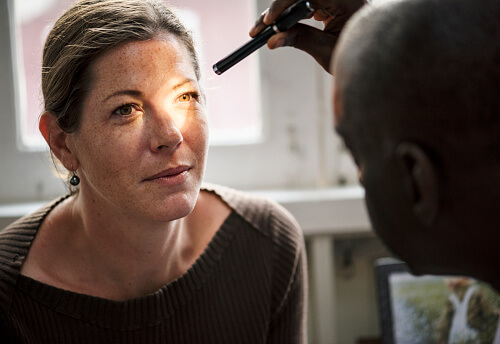What’s always working in the background, even when you don’t see it? Your heart! No wonder heart health is so important.
As an amazing muscle that beats about 100,000 times a day, the heart is what keeps us all going—pumping oxygen-rich blood that other organs (like the lungs, brain and kidneys) need to stay healthy.
With all the good things your ticker does for you, it deserves some TLC. That’s especially true given the risk of heart problems: Heart disease can happen when the heart gets damaged from clogged arteries or other heart conditions. Sadly, it’s the number one killer worldwide.
Even more alarming, the numbers are increasing. Per a recent study by the Journal of the American College of Cardiology: “From 1990 to 2019, cardiovascular disease cases almost doubled, increasing from 271 million to 523 million worldwide.” Deaths from heart disease also increased in this same time frame, even with advancements in technology.
Fortunately, simple day-to-day actions can reduce your risk for heart problems while providing all the other benefits of a healthy lifestyle, from improving your mood to fighting fatigue and more. So this year, resolve to be a little kinder to your heart, and improve your longevity in the process, with these easy health tips.
Eat for a Healthy Heart
You are what you eat! What you put into your body can have a direct impact on your heart health.

1. Eat a Nutritious and Balanced Diet
Experts recommend a balanced diet full of protein and fiber that incorporates these categories:
- Fruits and veggies
- Whole grains
- Legumes
- Protein-rich foods, such as fish, eggs and nuts
- Healthy fats from ingredients like olive oil or avocado
One fun way to incorporate more fruits and veggies into your diet? Shop what’s in season!
2. Keep Satisfying Snacks Around
We all get hungry between meals, and not snacking is not the sustainable or recommended answer. Instead, pick choices that will actually satisfy your hunger and cravings. To do this, opt for high-protein treats that will leave you fuller longer, like whole-grain crackers with hummus or Greek yogurt with banana and granola.
3. Pair for Success
Sometimes, all we want is a cold Reese’s from the fridge or a decadent spoonful of Nutella. And while there is nothing wrong with that, regularly grabbing those treats without anything accompanying them won’t leave you actually nourished, meaning you’ll be unsatisfied. Plus, they can lead to a spike in blood sugar. But instead of removing, try adding—which will help with both. For example, if you’re craving Nutella, add berries to get more essential vitamins and good-for-you ingredients. Or, if all you want is a cozy bowl of mac and cheese, add broccoli to the boiling water for the last two minutes to round out the meal a bit more.
4. Plan, But Make it Fun!
Set yourself up for success and enjoy the process. Crack open some cookbooks or search for online recipes to build a weekly shopping list and meal/snack plan. Follow dietitians online who specialize in heart-healthy eats to get inspired. Try new kitchen hacks and utensils. Pass along recipes to your friends or family, and ask for theirs. You can even create a shared online cookbook! Make every aspect of planning and executing a good-for-you menu something to look forward to.
5. Build Momentum
It’s a proven fact that most diets fail. According to a recent study by healthline, “Most diets lead to weight loss and lower blood pressure, but these desired effects largely disappear after a year.” Why? Largely because the changes being made are not sustainable. But eating foods that benefit your heart, which usually also benefit your entire being, shouldn’t be thought of as a diet. In fact, they should be viewed as a non-negotiable. But how do we make lasting lifestyle changes when it comes to food? Some tips include:
- Making small, sustainable swaps or enhancements and building upon that momentum, rather than making large, sweeping changes that aren’t realistic to maintain.
- Viewing eating well as a privilege, not a punishment.
- Giving yourself grace when you don’t follow your plan 100%. It’s better to show up imperfectly than not at all, and you deserve to show up for yourself.
Get Your Heart Pumping
Physical activity can help your heart in many ways, from lowering your blood pressure to reducing stress. Between these benefits and many others, exercise is a critical piece of a heart-healthy lifestyle. Just make sure you ask your healthcare provider before trying a new exercise routine.

5. Get and Stay Active
Staying active is just as important, if not more, than getting active. Experts say to aim for 150 minutes per week (or more) of moderate physical activity. This can include things like pickleball or swimming to a brisk walk or kitchen dance session that gets the heart pumping!
6. Mix It Up
Like most things, balance is best. A combination of activities that build muscles and keep your heart rate up is a good idea, plus you’ll be less likely to get bored. Try to fit in strengthening exercises (like lifting weights) at least twice a week. If weights feel daunting or inaccessible, using your body weight is free and effective.
7. Keep It Fun
Fitness shouldn’t be something you dread, otherwise you’ll never want to do it. If you fall into that camp, experiment with new things to make activities more enjoyable. Hiking, gardening, calling a loved one while on a walk, or following along with how-to dance videos online can all help take the work out of workouts.
8. Don’t Overdo It
Listening to your body is essential to health as a whole. At the end of the day, you should know yourself better than anybody. Your body will signal to you when it needs something, like to take it easier or a rest altogether. Your duty is to honor that. In fact, a key part of having a successful workout regime is knowing when to take a day to let your muscles heal. Taking a breather has countless benefits, while over-working yourself can lead to unintended consequences.
Get Regular Healthcare
Your healthcare team can help you assess your heart risk, develop goals for healthy living and recommend necessary screenings, tests, procedures and medications to keep you feeling your best.

9. Schedule Routine Checkups
Find a primary doctor you like and schedule routine appointments as they recommend. Many preventive services such as cholesterol or blood pressure tests may be free with health insurance. For optimal health, be sure to keep all appointments, even the eye doctor. That’s right; our eyes are more connected to our heart health than many know. In fact, “the arrangement of blood vessels at the back of the eye, known as the retina vasculature, is closely connected to the health of your heart. That means issues we see in the eye can be directly linked to health problems with the heart and the vessels in your body,” per UChicago Medicine.
10. Take Medications as Directed
If you’re prescribed medications to treat high blood pressure or cholesterol, take them exactly as instructed. You should never stop taking medications without consulting your doctor first.
11. Share Your Family History
Since some heart problems can run in families, tell your doctor about any health problems close relatives have had. For example, let them know if your parents had heart disease before age 55 (for men) or 65 (for women).
12. Play an Active Role in Your Healthcare
You have a voice in your healthcare, so use it! Be sure to ask questions and bring up any symptoms or concerns to your doctor. They’re there to listen and help you on the journey to good heart health.
13. Take Care of Your Teeth, Too!
Studies have shown a link between gum disease and heart disease. Help prevent gum disease by brushing your teeth after meals, flossing and using mouthwash. You should also see your dentist regularly. Keep an eye out for swollen, red gums that are tender to the touch or bleed easily.
Manage Your Stress Levels
A commonly overlooked factor to heart health is stress. Stress can negatively affect your heart health in many ways, from raising the risk of high blood pressure to impacting cholesterol levels. Exploring ways to confront and cope with your stress can support your heart health—as well as your overall well-being.

14. Identify Your Stress
Everyone has different stress triggers. Learn to spot yours by keeping a journal and writing down how you feel every day. When you are feeling stressed, what sensations is your body experiencing? Can you identify the specific moment that your body starting signaling to you? Once you know what stress feels like and what leads to stress in your life, you can start to mitigate the impact of those stressors and try to rectify problematic patterns.
15. Connect With Others
Researchers have found that social relationships may help reduce your risk of high blood pressure and other problems—and may even help you live longer. Prioritize your friends, loved ones and even strangers. Community is everywhere, from local gardening clubs to library classes. Even just hearing a loved one’s voice can make a difference, so if it’s more accessible, keep up with others with regular virtual check-ins. It’s never been easier to send a thoughtful text to a friend or call a loved one and ask about their day.
16. Practice Self-Care Daily
Acts of self-care can vary depending on what works for you. Some people enjoy taking a long soothing bath, diving into a good book or doing calming exercises like yoga or tai chi. Even just taking five minutes out of your day to close your eyes, deep breathe or name five things you’re grateful for can change the course of a day. Some self-care practices are a bit harder than putting on a facemask or listening to your favorite album, like working to break people pleasing patterns or setting boundaries, but they’re worth it. Protecting your peace = protecting your heart.
17. Get Enough Sleep
Quality slumber can help you feel more rested during the day while lowering your risk for major health problems like high blood pressure. Most adults need at least 7 hours of sleep per night. If you’re having trouble sleeping, experts agree that keeping your cell phone out of the bedroom and limiting scrolling before bed may help.
18. Talk to a Professional
Everyone has things worth talking out with someone trained to help. Ask your primary care provider for a referral to a therapist, or search for yourself on Psychology Today. A professional can help you work through your unique stressors and barriers that keep you from living your best life.
Acknowledge and Work on Bad Habits
Unhealthy habits like smoking, heavy drinking and taking illicit drugs can have various impacts on the heart, from narrowing blood vessels to making your heart muscle more prone to pumping problems.

19. Quit Using Tobacco
If you use tobacco, quitting is one of the best things you can do for your heart health. Within two weeks of smoking your last cigarette, your blood flow starts to get better throughout your body. Take the first step by making a quit plan on smokefree.gov.
20. Limit Alcohol
If you drink, do so moderately. Experts recommend no more than one drink per day for women and two per day for men. What’s considered one “drink” can vary by the alcohol type: 4 ounces of wine, 12 ounces of beer and 1.5 ounces of 80-proof liquor.
21. Address Substance Disorders
If you suffer from addiction issues, treatment can help. Get yourself the support you deserve by calling the Substance Abuse and Mental Health Services Administration (SAMHSA) hotline at 1-800-662-HELP (4357).
Know the Signs of a Heart Attack—and What to Do If It Happens
If you believe that you or someone you know has a heart attack, act fast to get help. Every minute is precious, so dial 911 right away.

22. Learn to Spot the Signs
General signs of a heart attack include:
- Chest pain
- Lightheadedness
- Pain in the neck, jaw or back
- Pain in the arms or shoulders
- Shortness of breath
Women may have different symptoms, like extreme tiredness or indigestion.
23. Get Help ASAP
Call 911 right away and try to calmly stay on the line with the dispatcher to answer their questions. If you’re with someone who has gone unconscious, let the 911 operator know; they may want you to do CPR or chest compressions. It’s a good idea to take an online CPR class; you could save a life.
24. Be Safe, Not Sorry
Because many heart attack symptoms are shared or common, especially for women, it can be difficult to self-diagnose. But when in doubt, it’s better to safe than sorry. It’s never dramatic to be cautious. If all the doctor does is give you some Tums, consider yourself one of the lucky ones.
25. Be Gentle With Yourself
There’s a well-known Chinese proverb that says, “A journey of a thousand miles begins with a single step.” Don’t be overwhelmed at the thought of changing your daily routine. Instead, take small, incremental steps towards a happier, healthier life. It’s better to do something than nothing, and over time, you’ll be amazed how seamlessly your routine has changed.
26. Make Heart Health a Priority, All Year Round
Your heart does a lot for you every second of every day. Return the favor by taking care of it for the long-term: Eat well, get active, bust stress, address bad habits, find a healthcare team and learn to spot the signs of heart trouble so that you can get yourself or others prompt treatment. Keep up good habits and find a support network of loved ones and doctors who can keep you accountable and healthy.
This informational material shall not be considered medical or health advice. You should always consult your health care provider before changing your diet or starting a new exercise regimen. The Hartford assumes no responsibility for any decisions related to your medical or health care. Consult with your health care provider, nutritionist or other health professional before making any decisions that may impact your health and well-being.







i am 81,do many of these suggested habits daily, however there is always room for improvement. ty for helpful info:)
I want to add more veggies to my diet. This month I am putting out starts and seeds for my home garden.
That is both exercize and food related. Also that is, for me, a destresser.
Thank you for every article. It’s encouraging to know that you have concern for others and that we can learn or refresh our knowledge.
Absolutely important for everyone to grasp the importance of heart health.
good easy to understand
Great information, very informative, thanks